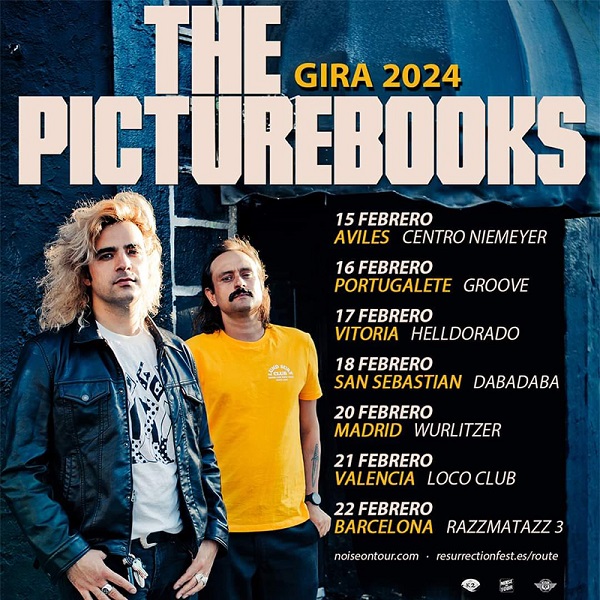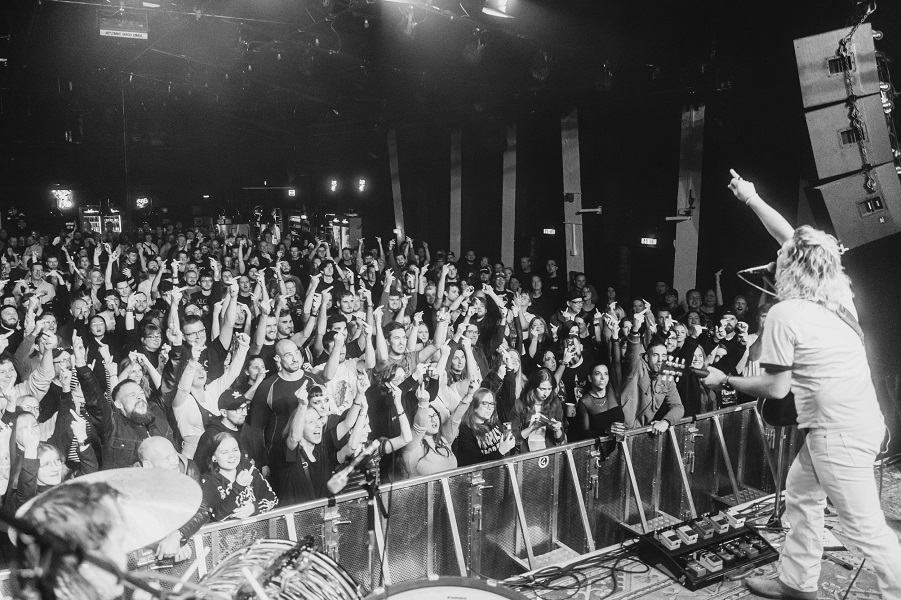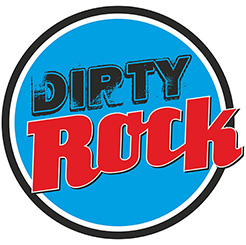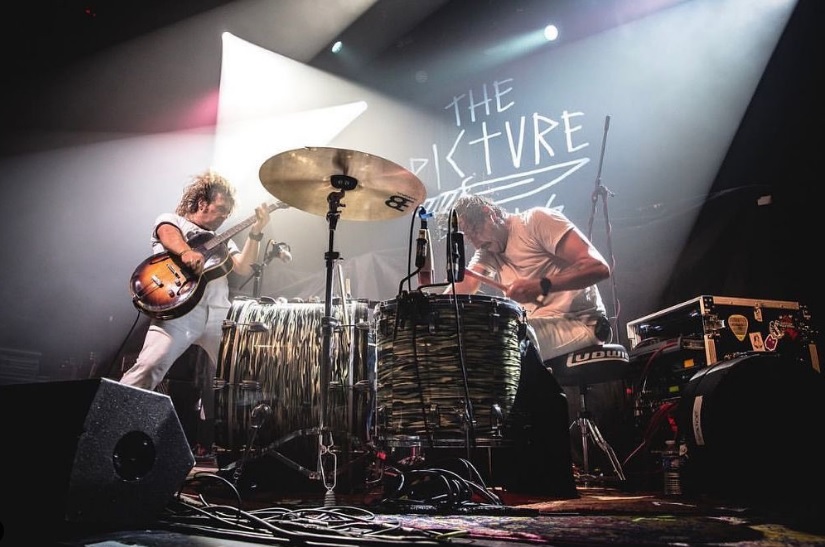Los alemanes The Picturebooks , o lo que es lo mismo Fynn Grabke (voz, guitarra) y Philipp Mirtschink (batería, percusión), nos visitan este mes de febrero para presentar su potente rock blues y metal primitivo plasmado por ejemplo en el último y sexto álbum de estudio, “The Major Minor Collective”. Era un buen momento para tener una charla con Fynn, que nos atendió muy amablemente a unos días de llegar a nuestro país.

Mientras muchas personas aprovecharon la pandemia para sus proyectos individuales y en solitario, vosotros aprovechasteis las tecnologías para hacer un álbum comunitario, rompiendo los muros construidos por el virus. ¿Cómo surgió la idea?
F: Supongo que la idea surgió de forma natural. Nosotros no teníamos ganas de hacer conciertos on line como hacía mucha gente. Lo de salir en vivo en Instagram o algo así y tocar una versión de mierda de tus canciones en pijama no es nuestro estilo. No queremos decir que no hubiera artistas que hicieran un buen trabajo con eso, pero no estaba en nuestras cartas. No lo sentíamos.
Entonces nuestras mentes empezaron a divagar y la idea fue tomando forma. Comenzó simplemente con nuestro nuevo álbum, luego la idea de tener un cantante invitado, luego un músico invitado y así sucesivamente hasta que hicimos una página de inicio con un montón de canciones que pre-produjimos y enviamos a artistas que nos gustaban y respetábamos, así que podían elegir la canción con la que quisieran trabajar. Fue increíble ver lo que se les ocurrió. Nos abrió nuevas puertas, creativamente y para nuestra carrera.
Para una banda acostumbrada a hacer 200 conciertos al año, ¿fue muy difícil acostumbrarse a no poder hacerlo y a no saber cuándo volvería todo a la normalidad?
F: Fue algo estresante, sin duda . Fue la primera vez en años que desempaquetamos nuestras maletas y utilizamos nuestros armarios y demás. Me llevó un par de semanas acostumbrarme. Luego hubo una fase en la que nos encantó y luego definitivamente hubo una fase en la que fue demasiado. Creo que mucha gente se sintió así. Tener una salida creativa nos salvó la vida.
Habéis colaborado con muchos músicos de tu generación, pero imagino que tocar con Chrissie Hynde fue algo especial, ¿verdad?
F: ¡Fue increíble! Quiero decir que esta mujer es una maldita leyenda. Recuerdo haber llevado una camiseta de Pretenders en el skate park cuando tenía unos 12 años. Fue en Venice Beach y una señora se me acercó y me dijo: “¿Conoces esta banda? ¿Cómo es posible que un niño de tu edad lleve una camiseta de Pretenders? Yo solo la miré y le dije: “Pretenders son mi banda favorita, vi esta camiseta en una tienda de segunda mano y la compré”. Ja ja. Así que como ves soy fan desde hace mucho tiempo.
Le conté a Chrissie esta historia y creo que ella posiblemente no me creyó. Ja ja. Quiero destacar lo increíble que es como artista pero también como persona. Te dicen que no conozcas nunca a tus ídolos, pero eso no aplica con ella. Conócela y descubrirás que se puede ser una superestrella del rock and roll y seguir siendo una persona agradable y decente. Trabajar con ella fue un gran honor y ahora hacer una gira por el Reino Unido y la UE con ellos es una gran bendición. ¡Estamos más que entusiasmados y agradecidos!
Después de dos discos iniciales, estuvisteis dos años sin escuchar música. ¿Cómo influyó a la hora de componer y grabar el tercer disco?
F: Los primeros dos álbumes fueron muy diferentes a lo que estamos haciendo ahora. Teníamos una base y yo era muy joven. Tenía 17 años cuando firmé con Noisolution Records y simplemente lo intentaba. Estoy muy orgulloso de lo que se nos ocurrió en aquel entonces, pero necesitábamos un cambio. Tim, nuestro bajista, dejó la banda y Philipp y yo nos fuimos a Los Ángeles. Nos dimos cuenta de que necesitábamos un gran cambio y estábamos buscando formas de hacerlo realidad. Hubo un momento en que nos preguntamos cómo sonaríamos si no nos inspiráramos en la música nueva y popular o algo así.
¿Cómo sonaría nuestro núcleo interno si no estuviéramos tratando de encajar? Porque todos lo hacemos de una forma u otra, ¿verdad? Así que se nos ocurrió la idea de dejar de escuchar música por un tiempo, ni hacer música tampoco; y luego ir al estudio y simplemente grabar lo que se nos ocurriera. Sentí como si rompiéramos una presa la primera vez que empezamos a tocar. Simplemente mezclamos todo con micrófono y registramos lo que estaba sucediendo y eso fue lo que se convirtió en un “caballo imaginario” . Fue una experiencia muy inspiradora. “Home Is A Heartache” es una especie de eco de “Imaginary Horse”, inspirada tras tocar en cientos de shows por todo el mundo y en la vida en la carretera.
¿Es fácil combinar el skate con las giras? Una caída puede ser fatal para el tour.
F: Tratamos de mantener el skate al mínimo en las giras, lo que a veces puede ser un desafío porque, después de todo, somos skaters de corazón. Siempre decimos que no somos músicos, somos skaters haciendo música. Creo que los skaters son los únicos que realmente entienden lo que queremos decir con eso. Un skater tiene una visión del mundo completamente diferente a la de los demás. No solo vemos un banco, vemos posibilidades de qué podemos hacer con él y si podríamos ir a cualquier lugar para crear un nuevo spot (N.R.: spot es un lugar perfecto para practicar skate).
Nosotros vemos las formas en esculturas, arquitectura y cualquier otra cosa y las clasificamos en patinables o no. Observamos la textura del suelo y nos preguntamos si es pegajoso o no. Vemos una escalera y nos preguntamos si el rellano está bien… es una historia de nunca acabar y una vez que tu mente está programada de esta manera, no hay vuelta atrás.
¿Crecer en un autobús de gira fue una lección importante sobre qué hacer y qué no hacer en una banda y en la vida?
F: Creo que sí. Definitivamente me marcó en muchos sentidos. Definitivamente me hizo aceptar mucho a los demás y sus cosas, problemas, tics, cuestiones, sentido del humor… Me di cuenta de que otros niños en la guardería o más tarde en la escuela no eran así en absoluto. Estaban saliendo solo con los de su clase. Yo pude relacionarme con cada uno de ellos, pero no les gustó que me estuviera relacionando con otros grupos que no les agradaban, etc., lo que me hizo enfatizar con los débiles y los solitarios, generalmente porque no les importaba, simplemente apreciaban a alguien si pasabas un rato vagabundeando con ellos.
No les importaba quién, qué o dónde, simplemente disfrutaban de no estar solos. Honestamente nunca tuve problema con estar solo, mi problema era ver sufrir a los demás, siempre me hizo querer cambiar eso. Eso es lo que pensé en las giras. El estar abierto a los demás pase lo que pase, identifique si alguien se está quedando un poco atrás y animarlo y tratar de disfrutar el viaje. No vamos a salir vivos de esto, no tenemos otra opción…
Tu nuevo single trae novedades, ¡Philipp usa platillos! ¿Es un experimento específico o una evolución? ¿Algún plan para grabar un nuevo álbum o es sólo un sencillo?
F: Nuestro nuevo álbum está listo y definitivamente es una evolución. Nosotros, The Picturebooks, siempre evolucionaremos. Así somos. Somos skaters, seguimos adelante, intentamos encontrar nuevos lugares para patinar, nuevos equipos, nuevos trucos… está en nuestro ADN. Lo importante para nosotros es que el núcleo siga siendo el mismo. Los dos mejores amigos haciendo lo que les encanta hacer y se divierten haciéndolo.
¿Qué prefieres, el proceso creativo en el estudio o tocar en vivo?
F: Amamos ambos, pero hacer giras es lo mejor del mundo y es por lo que entramos en el estudio. Dicho esto, también es muy muy desafiante y agotador, especialmente si haces tantas giras como nosotros, por lo que tener nuestro propio estudio en un pequeño pueblo de Alemania donde vive nuestra familia y demás es a veces una buena manera de cargar baterías y una excelente manera de procesar lo que está pasando y sacar provecho de ello.
¿Con qué músico, vivo o muerto, te gustaría colaborar?
F: ¡tantos! Lou Reed, David Bowie, Robert Smith, Morrissey, Lemmy, Waylon Jennings, Peaches, Leonard Cohan, Jay-Z, Brandie Carlile, Neil Young, Pharrell Williams, Iggy Pop, Joan Jett…
¿Qué es lo más gratificante y lo más difícil de dedicarte a la música?
F: Tener que explicarle eso a la gente que no lo entiende es definitivamente lo más difícil. Lo más gratificante es imposible de explicar a la gente que no lo entiende, porque sólo si estás en ello lo consigues. Hay una vibra, un sentimiento, una cierta manta que te mantiene abrigado pero también lo suficientemente hambriento como para seguir adelante. Es una cuestión de amor y odio. Pero podrás ver el mundo de una forma que sólo muy pocas personas pueden verlo. Estamos muy agradecidos por estar en ese club.
¿Alguna experiencia “Spinal Tap” que hayáis tenido?
F: ¡¡¡Tantos!!! Nos dispararon 5 minutos antes del espectáculo en Albuquerque, Nuevo México, en un tiroteo. Me dispararon en el brazo pero me di cuenta cuando estaba en el escenario. Estábamos tan en shock que al principio intentamos ignorarlo, pero luego ya encima del escenario nos dimos cuenta de lo que había pasado. ¡Una locura!
Siempre nos gusta acabar descubriendo nuevos artistas. ¿Algún nuevo álbum, cantante o banda que puedas recomendar a nuestros lectores?
F: ¡O Zorn! ¡¡Desde Long Beach!!
Sabemos que España es uno de tus países favoritos. ¿Qué podemos esperar de su gira?
F: 110% de The Picturebooks. ¡Nada menos! ¡VAMOS!
ENGLISH VERSION
While many people took advantage of the pandemic for their individual and solitary projects, you took advantage of technologies to make a community album, breaking the walls built by the virus. How did the idea come about?
F: I guess the idea came naturally. We didn’t feel like doing any online performances like a lot of people did. Going live on insta or something like that and perform a shitty version of your songs in pyjamas didn’t feel like our style. We don’t want to say that there were artists out there that did a good job with that, but this wasn’t in our cards. We didn’t feel it. So our minds started wandering and the idea was building up.
It started with just our new album, then the idea to have a guest singer, then a guest musician and so on until we made a homepage with a bunch of songs that we pre produced and sent around to artists that we liked and respected, so they could choose a song that they wanted to work with. It was amazing to see what they came up with and it opened new doors for us, creatively and for our career.
For a band used to doing 200 concerts a year, was it very difficult to get used to not being able to do it and not knowing when everything would return to normal?
F: It was nerve wrecking for sure. It was the first time in years we actually unpacked our bags and made use of our cupboards and stuff. It took a couple weeks to get used to it. Then there was a phase where we loved it and then there was definitely a phase where it was too much. I think a lot of people felt that way. Having a creative outlet was life saving for us.
You have collaborated with many musicians of your generation, but I imagine that playing with Chrissie Hynde was something special, right?
F: it was unbelievable! I mean this woman is a freaking legend. I remember wearing a pretenders shirt at the skatepark when I was like 12 or so. It was in Venice beach and a lady came up to me and said: “do you even know this band? How come a kid your age is wearing a pretenders shirt?” I just looked at her and said: “Pretenders are my favourite band and I saw this shirt in a second hand store and bought it.” Haha. But that’s how long i´ve been a fan. I told Chrissie this story and I think she didn’t really believe me. Haha. I really want to point out how amazing she is as an artist but also as a person.
They say never meet your idols, but that doesn’t go for her. Meet her and see that you can be a rocknroll superstar and still be a nice and decent person. Working with her was such an honour and to now go on a UK and EU tour with them is such blessing. We’re beyond stoked and grateful!
After two initial albums, you spent two years without listening to music. How did it influence when composing and recording the third album?
F: the first 2 albums were very different to what we are doing now.we had basis and I was very young. I was 17 when I signed to noisolution records and was just going for it. I’m very proud of what we came up with back then but we needed a change. Tim our bassist left the band and Philipp and I went to LA. We realised we needed a big change and were looking for ways to make that happen. At one point we were wondering what we would sound like if we weren’t inspired by what ever is the new and hot music or something like that. Like, what does our inner core sound like if it wasn’t trying to fit in, because we all do in one way or another right?
So we came up with the idea to stop listening to music for while, not make music too and then go into the studio and just record what we come up with. It felt like we broke a dam the first time we started jamming out. We just miced everything up and recorded what was going down and that’s what became “imaginary horse”. It was a very inspirational experience. “Home Is A Heartache” is kind of an echo of “Imaginary Horse” inspired by playing hundreds of shows all over the world and just life on the Road.
Is it easy to combine skateboarding with touring? A fall can be fatal for the tour.
F: we try to keep skateboarding at a minimum on tour which can be challenging sometimes because we are after all skateboarders at heart. We always say, we’re not musicians, we’re skateboarders making music. And I think skateboarders are the only ones that truly understand what we mean by that. A skateboarder has a completely different view on the world then others. We don’t just see a bench, see possibilities what we can do with it, and if we could move somewhere to create a new spot.
So we see shapes in sculptures, architecture and other things and categorise them in skate-able or not. We look at the texture of the ground and wonder if its sticky or not. We see a staircase and wonder if the landing is ok… it’s a never ending story and once your mind is programmed this way, there’s no turning back.
Was growing up on a tour bus an important lesson in what to do and not to do in a band and in life?
F: I think so. It definitely shaped me in many way. It definitely made me be very accepting to others and their things, problems, ticks, issues, sense of humour… I realised other kids in kindergarten or later school weren’t like that at all. They were hanging out with their kind only. And I was able to hang with each of them but they didn’t like that I was getting long with other groups that they disliked and so on which left me emphasise with the weak and loaners usually cause they didn’t care they just appreciated someone noticing them and hanging out with them.
They didn’t care who or what or where, they just enjoyed not being alone. Where I honestly never had a problem with being alone, my problem was seeing others suffer, it always made me want to change that. That’s wha touring thought me. Be open to others no matter what, identify if someone’s little behind and pick back up and try to enjoy the ride, we ain’t getting out of this alive, might as well…
Your new single brings news, Philipp uses cymbals! Is it a specific experiment or an evolution? Any plans to record a new album or is it just a single?
F: our new Album is done and it’s definitely an evolution. We, The Picturebooks, will always evolve. It’s the way we are. We’re skaters, we move on, we try to find new spots to skate, new gear, new tricks… it’s in our DNA. What’s important to us is that the core remains the same. 2 best friends doing what they love to do and have fun doing it.
What do you prefer, the creative process in the studio or playing live?
F: we love both but touring is the best thing in the world and it’s why we’re in the studio. Having said that, ins also very very challenging and exhausting, especially if you tour as much as we do, so having our own studio in a small town in Germany where our family lives and stuff is sometimes a nice battery charger and a great way to process what is going on and make at out of it.
Which musician, living or dead, would you like to collaborate with?
F: so many! Lou Reed, David Bowie, Robert Smith, Morrissey, Lemmy, Waylon Jennings, Peaches, Leonard Cohan, Jay-Z, Brandie Carlile, Neil Young, Pharrell Williams, Iggy Pop, Joan Jett…
What is the most rewarding and the hardest thing about dedicating yourself to music?
F: having to explain that to people that don’t get it is definitely the hardest. The most rewarding thing is impossible to explain to people that don’t get it, because only if you’re in it, you get it. Its a vibe, a feeling, a certain blanket that is keeping you warm but also hungry enough to keep going. It’s a love and hate thing. But you will get to see the world in ways only a very few people get to see it. Were very grateful for being in that club.
Any Spinal Tap experiences you’ve had?
F: so many!!! Got shot 5 minutes before showtime in Albuquerque, NM in a drive by shooting. I was hit in my arm and realised that when I was on stage. We were I shock or something that at first we tried to lough it off but later on stage realised what happened, crazy!
We always like to end up discovering new artists. Any new album, singer or band that you can recommend to our readers?
F: O Zorn! From long beach!!!
We know that Spain is one of your favorite countries. What can we expect from your tour?
F: 110% The Picturebooks. Nothing less! VAMOS!


